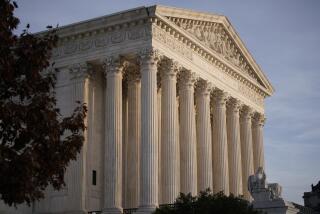A Shot Across the Bow From the Darkness
For many citizens, the notion of an American “secret court” would appear a striking contradiction in terms. Until last week’s disclosures by Congress, few Americans were aware that our government routinely used such a court to conduct searches of its own citizens for the purpose of foreign intelligence gathering, searches that would be denied as unconstitutional by any conventional court. However, this little-known court released to Congress a rare public opinion chastising Atty. Gen. John Ashcroft and disclosing dozens of secret violations by the Justice Department.
Most alarming is the disclosure of a plan by Ashcroft to change the role of the court in spying on citizens. Not only would the court no longer have foreign intelligence gathering as its primary purpose, but Ashcroft’s prosecutors would be in direct control of the use and dissemination of information gathered on citizens.
The opinion released Thursday details more than 75 cases in which the Justice Department supplied false information to the court to carry out secret searches. These are only the cases that the Justice Department itself has located and admitted to. Moreover, the court rejected Ashcroft’s effort to change its role in a way that would allow him to effectively circumvent the 4th Amendment in future searches of citizens.
The plan would allow a greater array of cases to bypass the federal courts, be exempted from basic constitutional requirements and then be handled in total secrecy.
The plan would create a one-stop convenience store for searches, avoiding the nasty constitutional traffic created by the nation’s framers in requirements of probable cause and meaningful judicial review.
Perhaps the most chilling aspect of this opinion is not its disclosures but its source. This court has never rejected an application for surveillance despite more than 1,000 such applications each year. It has all the trappings and little of the substance of a real court. There is even a secret appellate court, which, until now, has never considered a challenge.
During my brief stint at the National Security Agency, I had occasion to appear before this secret court--known as the Foreign Intelligence Surveillance Act, or FISA, court.
My first reaction was that it appeared like a bad set for a Maxwell Smart episode, with a series of doors and secret codes. The room that is sometimes portrayed as America’s Star Chamber would make most traffic courts look grand in comparison. I’m not sure if it was the gravity of the actions taken by the court or the casual atmosphere that most disturbed me.
Ironically, FISA was enacted as a reform in the wake of the Watergate scandal. Richard Nixon previously asserted the right to conduct unilateral searches in the name of national security, and Congress sought a compromise to create some form of legal process and review. It was a compromise that many would come to regret. While the framers required the government to satisfy probable cause in any search or seizure, FISA allows secret searches of citizens without meeting that standard.
That was not the only change.
Under federal law, a citizen who is subject to a government wiretap is eventually notified of the intrusion. This creates a certain deterrent of government abuse.
Under FISA, a team can enter your home, quickly scrub your computer, wire your house, install a device to record every keystroke on your computer and rifle your files. There is little deterrent of abusive because the victims are unaware that their privacy has been invaded.
It is not surprising that FISA has become the destination of choice for investigators with a hankering for a search but a paucity of evidence. While these searches were meant to be the exception rather than the rule, FISA eavesdropping orders now outnumber conventional ones.
In its opinion, the court acknowledges that “many hundreds of citizens” have been searched under its secret orders. Yet even this court could not stomach what Ashcroft demanded in secret papers.
Ashcroft went to the secret court to declare that, among other changes, it would now “be used primarily for a law enforcement purpose” and not its original foreign intelligence-gathering purpose. The court refused to sign on to such an interpretation and refused to allow the expanded use of FISA material. Undeterred, Ashcroft is now appealing to the secret appellate court (once anyone can remember where it is or who is on it).
Abandoning its past custom of absolute secrecy, the court released this opinion as a warning to citizens. We should not expect the luxury of a second shot across the bow.
*
Jonathan Turley teaches constitutional law at George Washington University Law.
More to Read
Get the L.A. Times Politics newsletter
Deeply reported insights into legislation, politics and policy from Sacramento, Washington and beyond. In your inbox three times per week.
You may occasionally receive promotional content from the Los Angeles Times.








